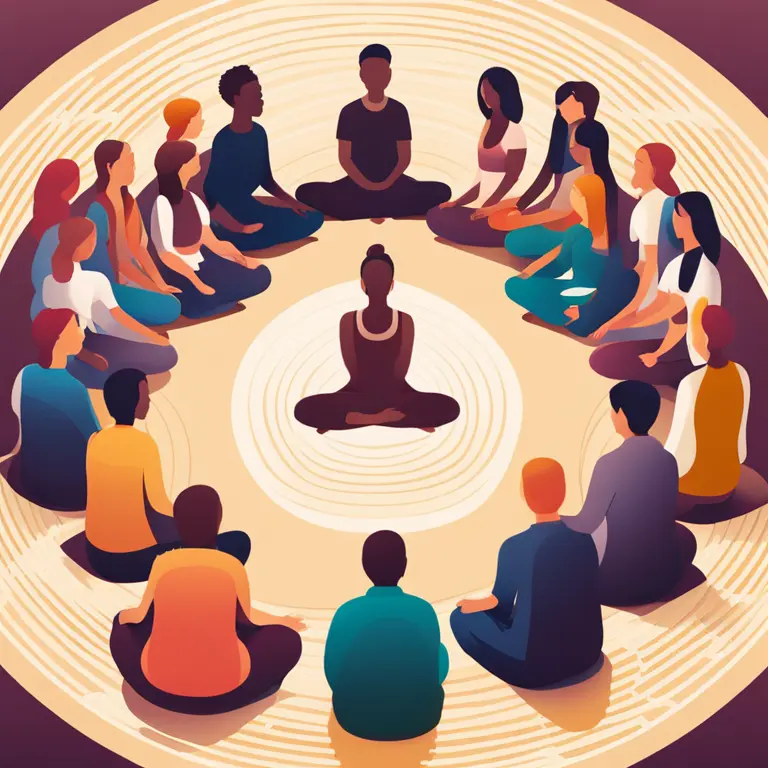
Mindful Bonds: Strengthening Relationships Through Meditation
Discover how the practice of mindfulness and meditation can foster deeper connections and strengthen relationships, promoting mutual growth and harmony.
article by Hina Kurosawa
Meditation: A Bond Beyond Silence
Mindfulness and meditation are often viewed as solitary practices, aimed at achieving personal peace and self-awareness. However, their impact extends far beyond individual benefits, influencing our relationships with others. When partners engage in regular meditation, they cultivate a shared space of understanding and empathy. This silent connection lays the foundation for stronger, more resilient bonds. Meditation's grounding effects help individuals manage stress and emotions, resulting in fewer conflicts and a heightened sense of partnership harmony. Moreover, meditation can help in recognizing and appreciating the present moment, making every interaction with loved ones more meaningful and enriched.

The Ripple Effect of Inner Calm
The tranquility that meditation instills within an individual is not contained; it ripples outward, touching the lives of those they are close to. As one cultivates inner stillness, reactions become more mindful, less reactive, promoting harmony in the relationship. Meditating together or individually leads to synchronized rhythms within relationships, where partners begin echoing each other’s calm demeanor. This phenomenon can create a cascade of positive interactions, where a simple peaceful presence can de-escalate potential disagreements and strengthen the bond shared between individuals. In essence, the peace one person achieves can become a shared resource for both.

Deep Listening Through Mindful Awareness
One key element of mindfulness is the practice of deep listening, being fully present, and attentive to your partner without judgment or distraction. This facet of mindfulness can transform communication within relationships. It encourages individuals to truly hear their partner's perspective, fostering understanding and reducing misunderstandings. By remaining present during conversations, we provide a supportive space for our partners to express themselves, which can be deeply affirming and strengthen the mutual connection. This attentiveness demonstrates respect and care, core components for any healthy relationship.

Compassion and Empathy: The Heart of Connectedness
A dedicated meditation practice often leads to the development of compassion and empathy—essential qualities for emotional intimacy in any relationship. When partners meditate, they can more easily step into each other's shoes, understanding feelings from a non-judgmental standpoint. This empathetic stance allows for a more compassionate approach to challenges, underpinning a sense of unity and shared experience. Nurturing empathy through meditation thus becomes a powerful tool in healing rifts and strengthening the loving-kindness shared between partners.

Handling Conflict with a Mindful Approach
Disagreements and conflicts are inevitable in relationships. However, meditation equips individuals with the tools to approach discord with a calm and clear head. A consistent meditation practice can help in staying centered and calm, even in the face of relationship storms. Partners who meditate tend to approach conflicts with less defensiveness and more openness to finding solutions. They draw from a well of patience and self-regulation learned through mindfulness, leading to healthier and more constructive forms of conflict resolution that are conducive to long-term relationship satisfaction.
Synchronicity and Shared Growth
Finally, meditation encourages personal growth, which, when shared with a partner, can lead to synchronicity and mutual development. As individuals evolve and unlock new understandings about themselves, they bring these insights into their relationships. This process of shared growth can be incredibly bonding, as partners witness and support each other's journey through life. The spiritual and emotional dimensions that meditation adds can also elevate the relationship to deeper levels of connection not solely based on physical or intellectual compatibility.
Published: 1/18/2024
Modified: 1/18/2024
More predictions
Come back here soon to learn more about yourself and your future


The Connection Between Meditation & Mindfulness
Discover the relationship between meditation and mindfulness, and how these practices contribute to mental clarity and inner peace.


Mindful Teaching: Meditation Practices for Educators
Discover the benefits of mindfulness meditation for educators seeking balance, enhanced concentration, and emotional wellbeing in a demanding profession.


Mindfulness & Meditation: Enhancing Cognitive Flexibility
Discover how mindfulness meditation can foster cognitive flexibility, improving your ability to adapt to new situations and think creatively.